Most Important Interview Questions

Whether you’re just entering the workforce or have years of experience under your belt, job interviews can be intimidating. Making sure your resume stands out from the rest to receive that call and then trying to answer questions in an impressive yet truthful way can be confusing and create a lot of anxiety. While there is no way to know what the person on the other side of the desk is really thinking, there are ways to approach an interview to better your chances of landing that job.

So what are hiring managers really looking for? We surveyed over 800 people who are currently or have been responsible for interviewing job applicants to find out what really sets candidates apart from the rest. Keep reading to find out how to best navigate your next job interview.
Answer Carefully
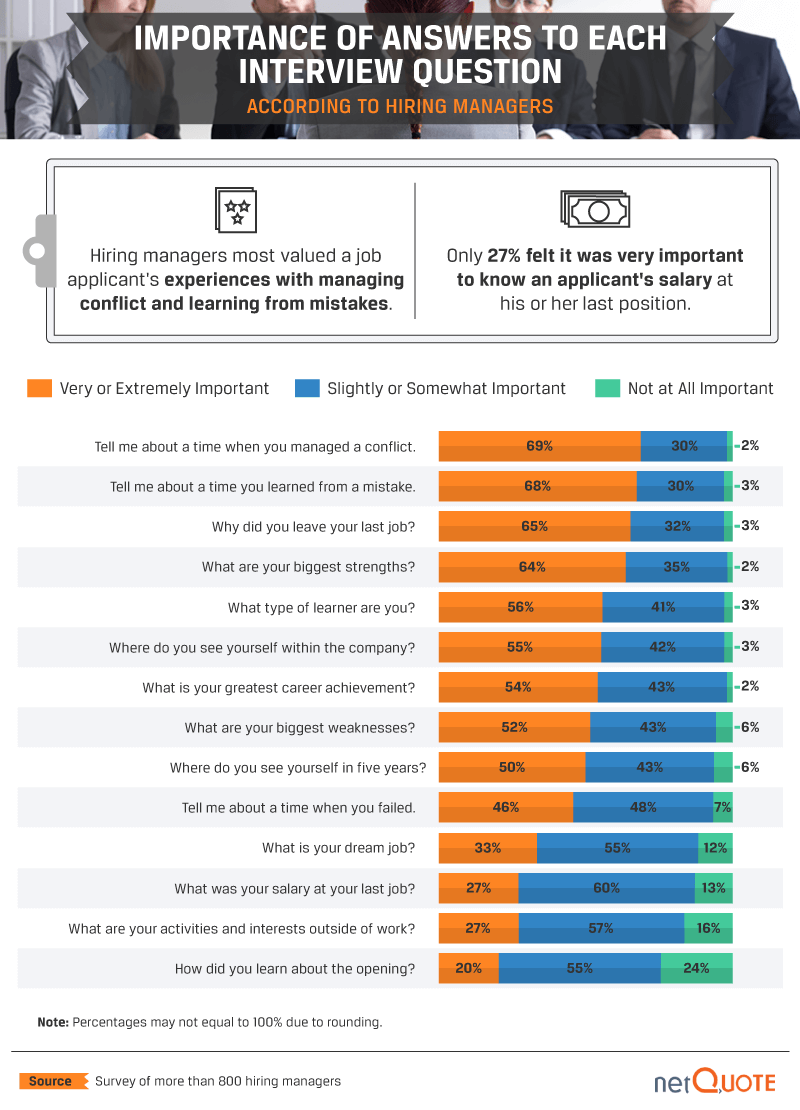
There is a long list of possible questions you could be asked at a job interview. Depending on the company and career field, some interviewers may even throw in some extra challenging ones. But which interview questions do hiring managers value your answers to the most?
Answers to questions about an applicant’s experience handling conflict and their ability to learn from their mistakes held the most value. Hiring managers also paid close attention to candidates’ reasons for leaving their last or current position. Activities and interests outside of work didn’t hold as much value to hiring managers, however – only 27 percent thought that information was very or extremely important.

Answers regarding salary were also pretty low on the list, with only a little over a quarter of hiring managers saying candidates’ previous salaries were very or extremely important. This information may become more valuable in later interview stages, when the cost of hiring becomes more of a deciding factor, though.
Strength in Soft Skills
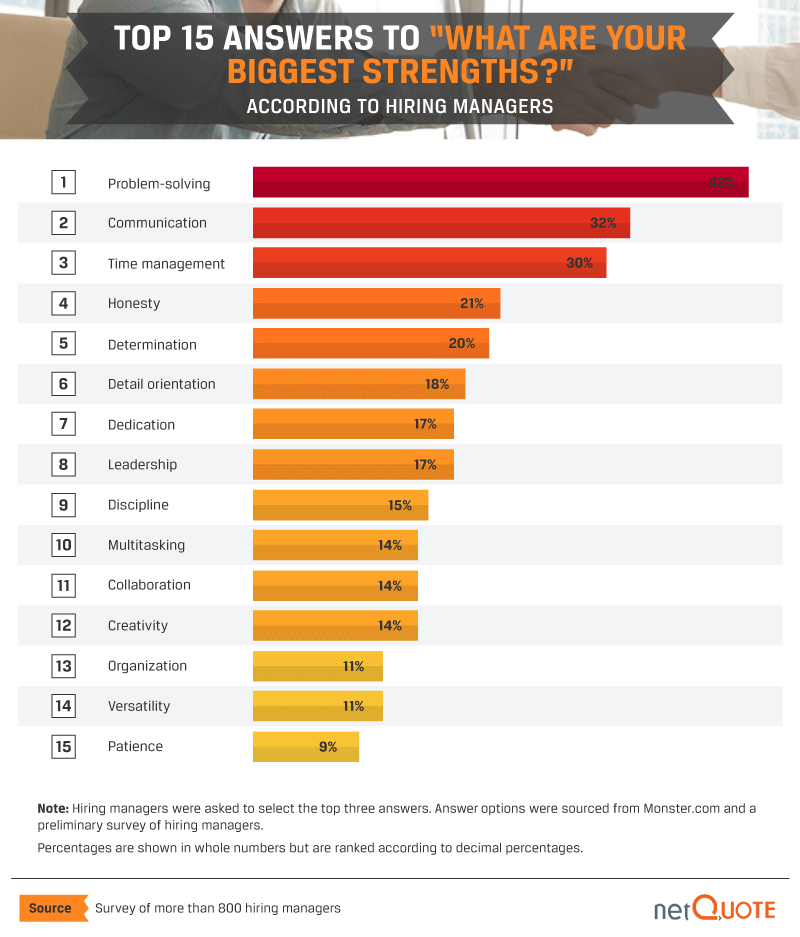
One of the things that makes interviews so nerve-wracking is the constant self-boosting applicants have to do. Most candidates are asked about their biggest strengths during the interview process, and the answers hiring managers are looking for may surprise you.

Often, applicants are predominantly focused on the hard skills required for a job — specific, learned skills that can be quantified — but it turns out that soft skills — intangible traits related to character — may be more important.
When asked about your strengths, talking about your problem-solving, communication, and time management skills are bound to impress the hiring manager. While some hard skills are necessary for meeting a job’s requirements, soft skills can set you apart from the rest. According to a recent study, business leaders tend to value soft skills over hard skills due to their ability to translate to any career path. Hard skills can be learned and improved, but soft skills are the root of one’s character and can be harder to learn.
There’s No I in Team
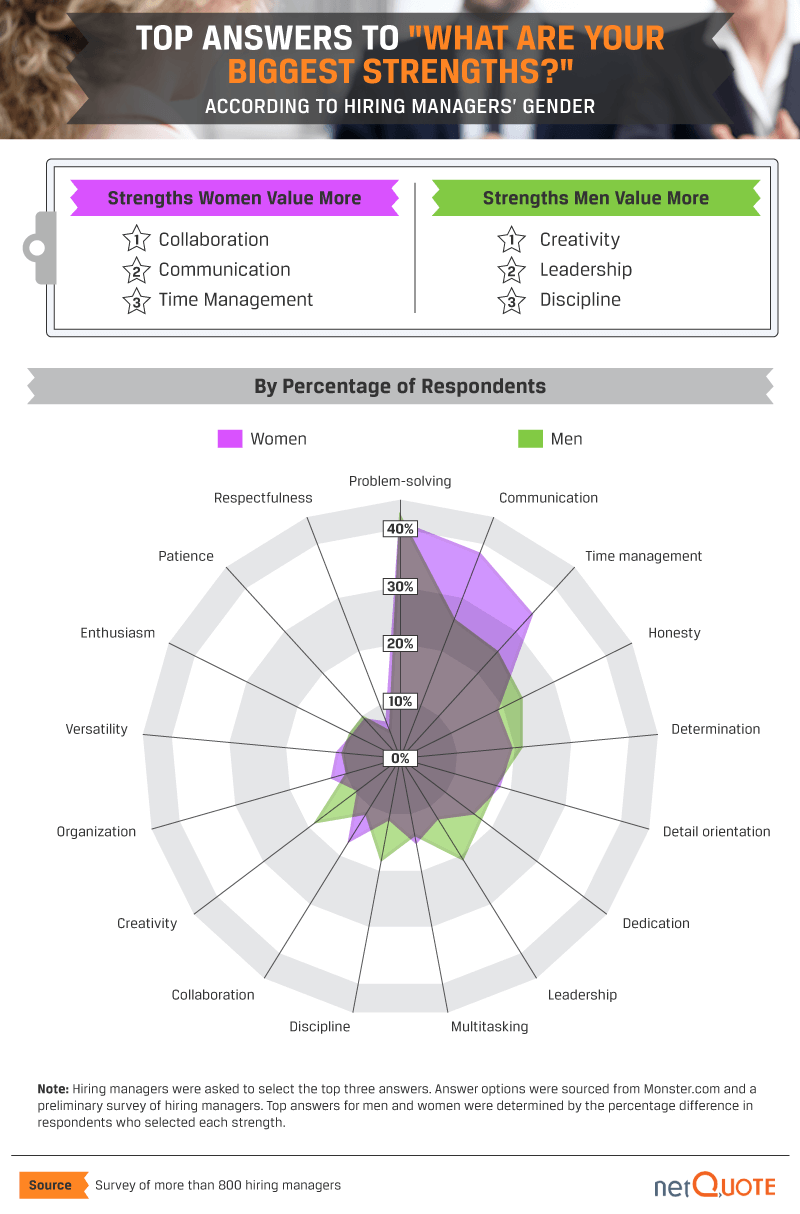
Depending on the gender of the hiring manager, the best answers regarding personal strengths can differ. Female hiring managers valued skills that served a more cooperative work style, like collaboration, communication, and time management. Male hiring managers, on the other hand, favored strengths that reflected a more independent work style. The top three strengths men valued more than women were creativity, leadership, and discipline.
Ideal Industry Strengths
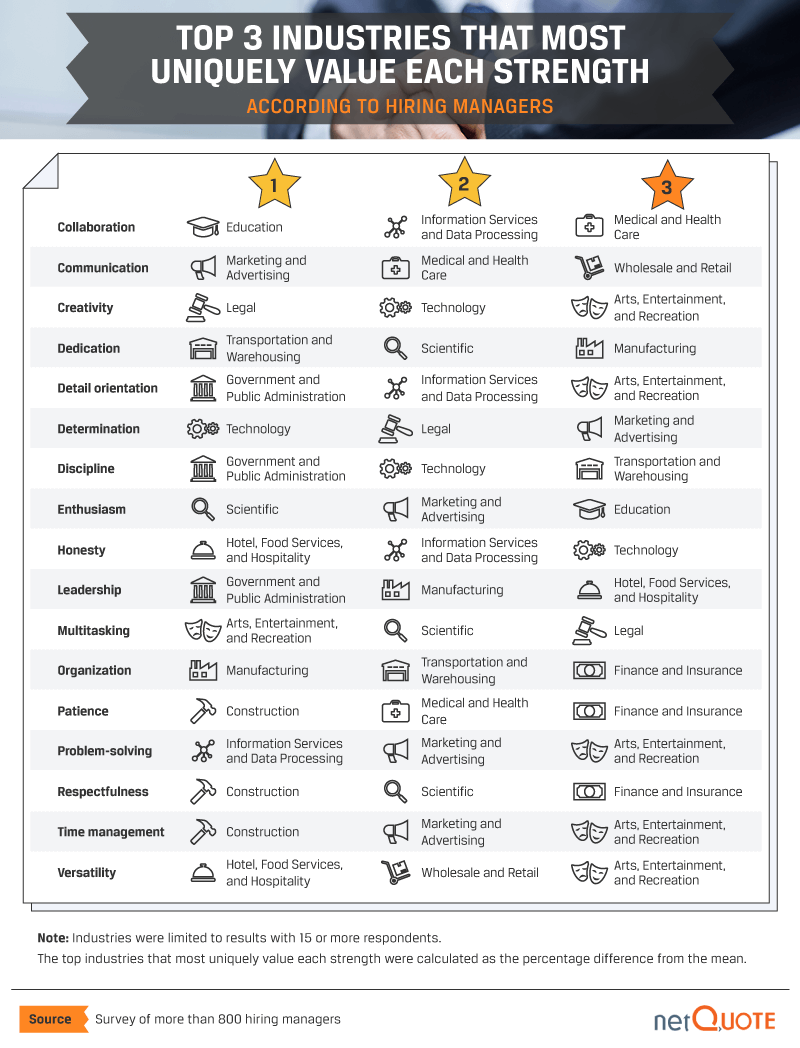
Of course, the most valued skills will vary by profession, so we broke down the top three industries that most uniquely valued each strength. When it came to problem-solving – the strength favored by hiring managers overall – information services and data processing valued it the most, followed by marketing and advertising and then the arts and entertainment industry. Leadership was most uniquely valued in government and public administration, while determination was most valued in the field of technology.
Resume Risks
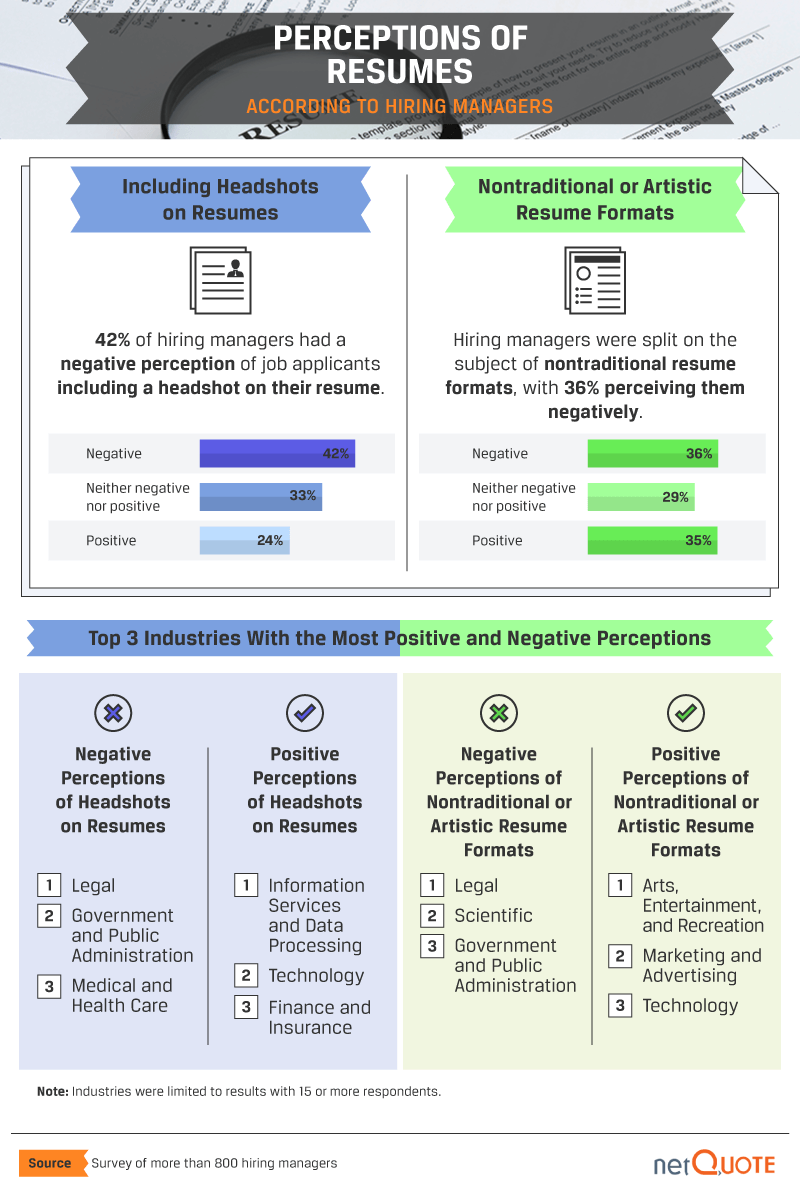
Writing a resume may be the most important step in the process of a job search – after all, your resume is what gets you the call for an interview. So what do hiring managers really think about your resume? If it comes with a headshot, you may not be getting that call after all. Forty-two percent of hiring managers had a negative perception of job applicants who included a personal portrait on their resume. If you happen to include a headshot, though, you’ll likely get the best response from the information services, technology, and finance and insurance industries.

For those taking the nontraditional, creative route, hiring managers had mixed feelings. While 36 percent perceived unconventional resume formats negatively, 35 percent were left with a positive perception. If you’re looking to send in a resume made of Legos or donuts, you may want to stick to the arts, marketing, or technology industries. Definitely stray from sending an edible resume if you’re applying for a job in the legal, scientific, or government and public administration industries, however. While it may make someone chuckle, it may do more harm than good.
Taking a Break

One of the biggest mistakes applicants can make on their resume is adding too much information and sending a resume that has one too many pages. A standard resume is said to be one to two pages long, which is likely why just over half of hiring managers said three pages were too many. For those applying to an academic or research position, the length of a curriculum vitae (CV) is much more flexible. But for non-academic resumes, skipping the details for a more concise resume is more likely to get a positive response from hiring managers.

Aside from the number of pages, the length of an employment gap shown on a resume is also important in making a good impression. Hiring managers in construction were the most lenient – an employment gap of up to two years and five months was seen as acceptable. The information services industry was the strictest, however, with hiring managers reporting a one-year and one-month gap as too long.
Now what?
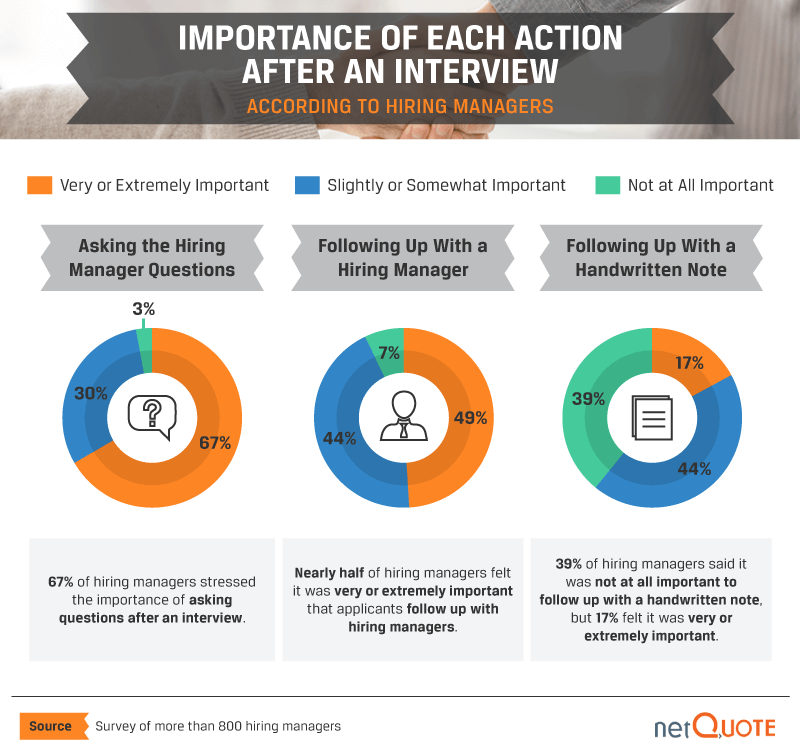
Getting through the interview is one feat, but what should you do while you’re waiting to hear back? Following up after an interview doesn’t impress some hiring managers. Less than half felt a follow up was very or extremely important, and only 17 percent thought the same about a handwritten follow-up.
The most important thing you could do following an interview is to ask the hiring manager questions. Sixty-seven percent found it very or extremely important to ask questions, while another 30 percent thought it was slightly or moderately important.
Administration Admissions
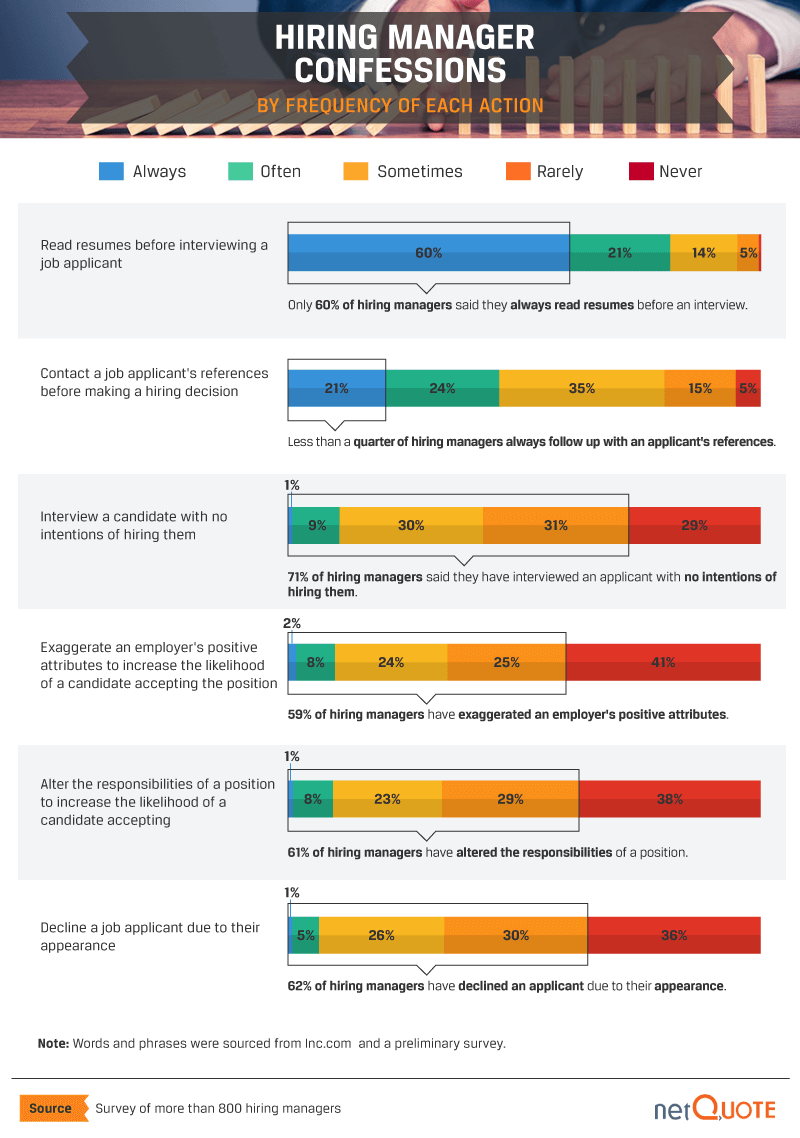
You’re familiar with your own preparation before an interview, but how do hiring managers prepare to interview you? Only 60 percent always read resumes, and less than a quarter always follow up with your references. While your reputation according to your references is important, the first impression may matter even more – 64 percent of hiring managers admitted to declining an applicant based on their appearance.
Don’t Say It
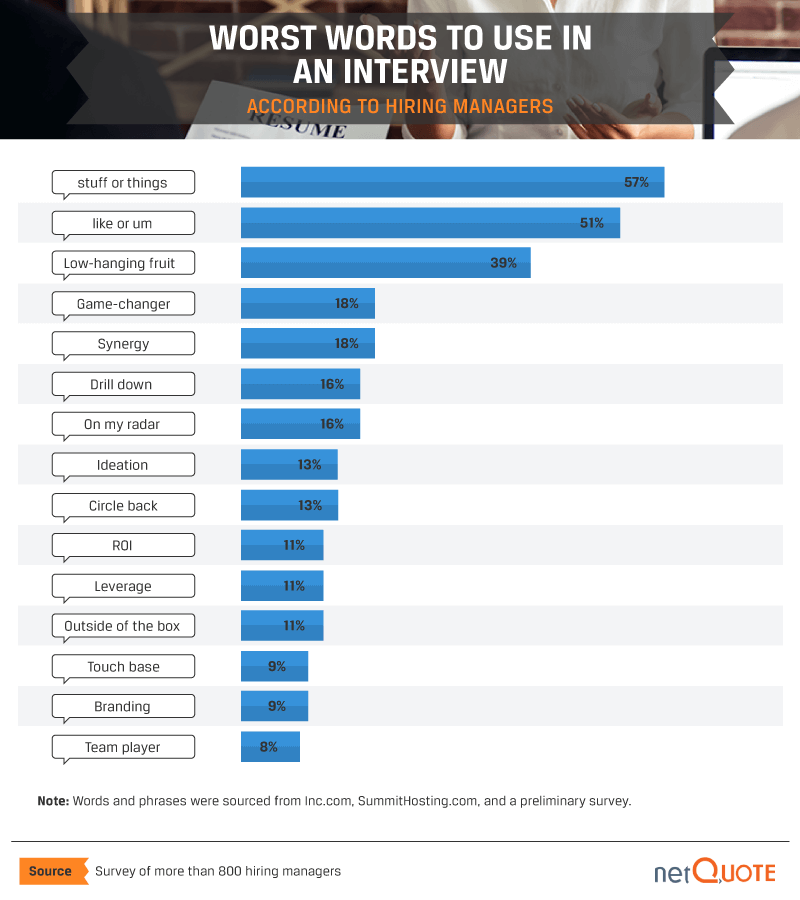
While hiring managers look for certain answers, they are also hoping you don’t say certain phrases. More than half said vague words like “things” or “stuff” and filler words such as “like” and “um” were words they didn’t want to hear an applicant say. Using buzzwords like “low-hanging fruit” or “game-changer” were also likely to get a negative response from interviewers.

Secure the Job, Secure Yourself
Preparing for an interview is usually a very nerve-wracking experience, but being prepared can decrease anxieties while increasing your chances of landing that job.
Keep your resume concise and informative, and when you get the call for an interview, have questions ready to ask the hiring manager when the interview is over. Don’t be too eager with following up while you wait to hear back, as it could backfire and turn away a potential employer. And when you get the call that you’ve got the job, make sure you’re protected by business, life, and health insurance.
At netQuote, you can browse various plans and find out how much coverage you really need. Visit us at netQuote.com to get a free quote on the plan that best fits your needs.
Methodology
We collected responses from 814 people whose job responsibilities currently or previously included interviewing job applicants for their employer. Fifty-two percent of participants were men, 48 percent were women, and less than 1 percent identified as a gender not listed in our survey. Participants ranged in age from 18 to 80, with a mean of 37 and a standard deviation of 11.5.
The data we are presenting rely on self-reporting. There are many issues with self-reported data. These issues include but are not limited to the following: selective memory, telescoping, attribution, and exaggeration. It’s possible that with a larger sample size of hiring managers, we could have gained more insight into this demographic.
Sources
- http://www.businessinsider.com/best-resume-soft-skills-employers-look-for-jobs-2018-4
- https://www.cnbc.com/2017/03/01/7-of-the-most-creative-resumes-weve-ever-seen.html
- https://www.forbes.com/sites/lizryan/2016/05/02/how-long-should-my-resume-be-and-15-other-resume-tips/#2c2f53fb3868
- https://www.thebalancecareers.com/cv-vs-resume-2058495
- /business-insurance/general-business-insurance
- /business-insurance
- /business-insurance/business-insurance-articles/stop-stressing-work
- https://www.inc.com/jeff-haden/27-most-common-job-interview-questions-and-answers.html
Fair Use Statement
Do you know someone preparing for a job interview that may gain insight from our findings? Feel free to share this study and use the images and content for noncommercial purposes. Just don’t forget to link back to this page to give the authors proper credit.
